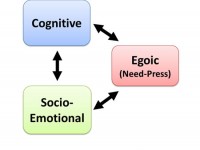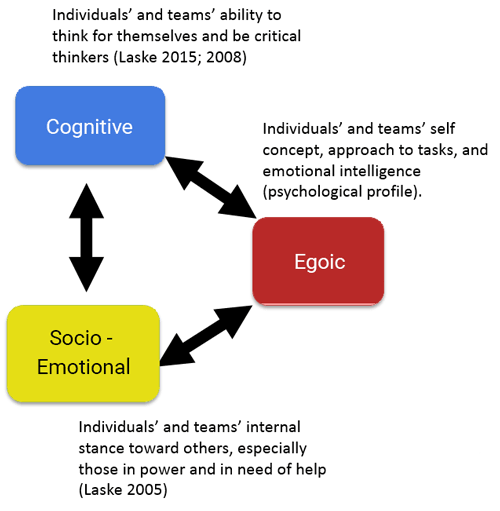Starting in 2014, coach education at IDM shifted to team coaching. In this blog, the reader finds materials that form the basis of my collaboration with Jan De Visch on the book "Dynamic Collaboration: Strengthening Self-Organization and Collaborative Intelligence in Teams" of 2018. One of the basic tenets of this book -- that organizations comprise different team levels or 'We-Spaces' -- derives from my social-emotional Team Typology found in volume 1 of "Measuring Hidden Dimensions: The Art and Science of Fully Engaging Adults" (2005, chapter 10). Below, the reader encounters some of the seminal ideas presented in the form of sets of slides and texts, each of them briefly commented upon as to its main topic. *** Introduction to Team Coaching based on CDF (2014) In this short text, I outline the IDM team coaching program. Based on an introductory 'Gateway' course, the program focuses on two main types of coaching: social-emotional and cognitive. Certification is based on undertaking a case study. Team Coaching for Maturity: IDM Gateway (2014) In this set of slides, I introduce coaches to the CDF perspective on organizational teams. The slides emphasize that teams are developmentally mixed (comprise divergent levels of adult development) and, in terms... Read More...
Category: CDF Mentoring
Foundations of Complex Thinking: What is missing from social media discourse
The papers collected in this blog center around the topic of complex thinking as a hallmark of individual freedom, organizational effectiveness, and societal well-being. They all focus on Lebensbefreiung, the unburdening from needless linear clutter in the mind and the obfuscation of communication. The articles point to, and explicate, a tradition of deep thinking that in the Western tradition began with Plato and survived to the time of Hegel and Heidegger, but through the onslaught of social media and simplistic 'agile' tool kits is presently at risk of being disavowed and forgotten, not only in education, but in training and management. The research reported in these papers is based on DTF, the Dialectical Thought Form Framework (Laske 1999, 2008, 2015, see publications at https://interdevelopmentals.org/publications/). DTF is a synthesis and refinement of work done by Basseches (1984), Bhaskar (1993), and Jaques (1994). It was born of the need to gain a comprehensive concept of adult development that has gone missing in the work of Loevinger, Kegan, and other 'developmental' researchers and their followers (like Wilber) by one-sidedly focusing on social-emotional, not also cognitive, development. By contrast, DTF transcends meaning-making toward sense-making both of which are needed to understand adult development in... Read More...
Can Coaches Nurture and Increase Team Maturity?
Since 2015, webinars and courses at IDM have addressed the developmental structure of teams and central issues of team coaching. Specifically, they have clarified notions such as 'self organization' in teams and their ability to develop 'collaborative intelligence'. The perspective taken has been adult-developmental, to the effect that self organization of teams is anchored in the self organization -- thus the maturity -- of individual team members, rather than being a mysterious quality of whatever team. The perspective greatly differentiates interventions that make sense with teams from a merely behavioral vantage point. Team coaches need to address two dimensions of self organization: the social-emotional and cognitive one which broadly overlap and influence each other. The teaching of team coaching has been based on Laske's social-emotional team typology that distinguishes three levels of team maturity. On each of these levels, a team is either downwardly or upwardly divided as a function of the relative maturity of team minority or majority. Clearly, each such team necessitates taking a different approach to intervention. The attached set of slides details the CDF team typology. The typology distinguishes 6 types of teams, or 'We-Spaces', 3 of them up-, and 3 of them down-wardly divided. The... Read More...
Zur Durchdringung organisatorischer Beratung mit Einsichten aus CDF
In diesem Artikel fuehre ich im Einzelnen die Geschichte und die Eigenart des Constructive Developmental Framework (CDF) aus. Ich moechte zeigen wie insbesondere ein soziologischer Beratungsansatz wie New Deal (Gucher 2015), aber auch aehnliche Beratungsvorgehen, durch Einsicht in die lebenslange Entwicklung von Menschen vertieft und im Dialog mit Kunden flexibel werden koennen. Der Nachdruck im Text liegt darauf, dass alle Dimensionen von Sozialkapital -- persoenliche Beziehungen, Emotionen, Aufmerksamkeit und Wissen -- in ihrer Bestehensweise und Verwendung entschieden von dem Reifegrad von Individuen und Teams abhaengen. Dies legt nahe, die auf New Deal beruhenden Interventionen durch sozial-emotionale und kognitive Werkzeuge aus CDF zu bereichern und dadurch zu staerken. Insbesondere erhoeht man durch CDF die Dialogfaehigkeit von Gruppen und Teams und staerkt das fuer eine kollaborative Arbeitsweise notwendige gegenseitige Vertrauen. Der Artikel behandelt sowohl wie man CDF durch Gruppenarbeit am Interdevelopmental Institute erlernt und wie man das erlangte Wissen in Kundenberatung und Coaching einfuehren kann. Anfragen ueber Lehrweise und Kosten der CDF Ausbildung zur dialogischen Beratung bitte an Otto Laske, otto@interdevelopmentals.org, richten. Durchdringung des New Deal mit CDF Feb. 2018 Read More...
New Dialog Methods for Broad-Spectrum Systems Constellations: Comments on the Milano Workshop on Intelligenza Collaborativa Nel Team
As shown at and, on this website, at , a workshop on new dialog methods specifically for creating collaborative intelligence in teams will take place in Milano, Italy, on January 30-31,2018. The workshop is offered by Consulenza Evolutiva, Milano and its Altroove School, and staffed by Lorenzo Campese, Alessandro Rossi, and Otto Laske. The workshop is a pioneering first in that it introduces Broad-Spectrum Systems Constellations which broaden the focus of attention of conventional constellations as detailed in the attached pdf. The workshop is held both in Italian and English. Those interested in signing up for the workshop with Consulenza Evolutiva will find further details on the workshop process below. Broad-Spectrum Systems Constellations Read More...
Thought Form Constellations as Measures of Team Connectivity
In this article, the author proposes structural, rather than behavioral or emotional, measures of team connectivity and introduces the notion of "cognitive" or "structural" systems constellations. These measures are derived from DTF, his Dialectical Thought Framework, a methodology rooted in cognitive developmental research since 1975. In contrast to the contemporary team literature, and in a follow up of an article co-authored with Graham Boyd on Distributed Leadership found in a book forthcoming at Palmgrave Publishers, UK, (#aboutBook), the author focuses on measuring team connectivity based on a team's cognitive behavior graph in real time. The author teaches DTF to both individuals, especially as coaches, and teams, in hands-on workshops in English and German, and with the help of a translator also in Spanish and Italian. TF Constellations 2 Read More...


